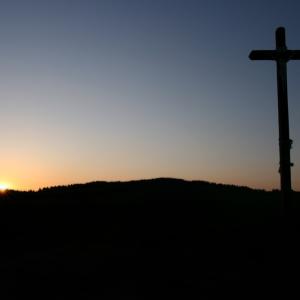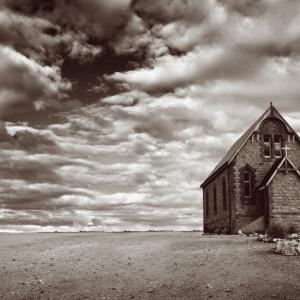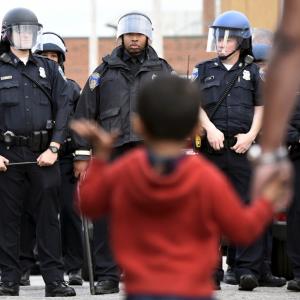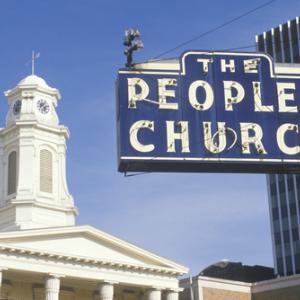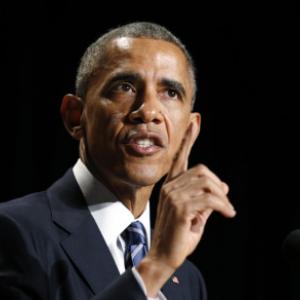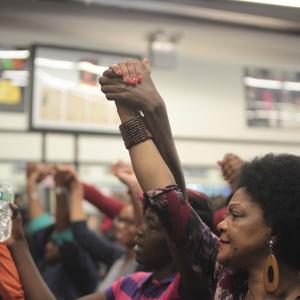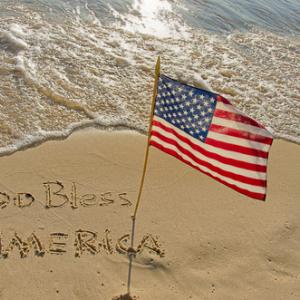Tom Ehrich is a writer, church consultant and Episcopal priest based in New York. He is the author of Just Wondering, Jesus and founder of the Church Wellness Project. His website is www.morningwalkmedia.com. Follow Tom on Twitter @tomehrich. Tom's posts appear via RNS.
Posts By This Author
What Might Tomorrow’s Faith Community Look Like?
It would be God’s incarnate presence in human life. Not the only presence, but one that many people could enter into. Not so much an institution with structures, rules, and layers of leadership, but rather a dynamic, ever-shifting community that gathered in various ways, ranging from small circles of friends to mass assemblies for special purposes.
It would look outward, unlike other human institutions that look inward. It would see people wanting to draw closer to God. It would see human needs such as grief and tragedy, hunger and hopelessness. It would see key moments in people’s lives, such as partnering and parenting. It would see the ways people hurt each other and the tendency of injustice to become systemic.
5 Ways Churches Inflicted Pain on Themselves
Let’s be clear: The much-heralded “decline of Christianity in America” isn’t about God losing faith in humankind.
It isn’t about losing our moral compass thanks to whatever you happen to loathe. It isn’t about fickle millennials. It isn’t about zigging trendy or zagging traditional.
In fact, I would argue that Christianity isn’t in trouble at all. Churches are in trouble. Denominations are in trouble. Religious institutions like seminaries are in trouble. Professional church leaders are in trouble.
But churches can’t hold God hostage.
How Ferguson and Now Baltimore Are Altering Our Perception of Law Enforcement
I enjoy cop shows on television.
My favorite is Blue Bloods, following the “Reagan” family from terrorist threats to homicides to domestic violence.
I can’t imagine what it’s like to be a cop. Perhaps routine marked by bursts of frenzy, some of it life-threatening. One’s hometown seen through the lens of crime, tragedy, and evil. Low pay, high risk.
I like Blue Bloods because it shows upright law enforcement taking “Protect and Serve” seriously and making brave and ethical choices.
These shows are quite unrealistic, of course. Crime doesn’t get solved that easily or snap decisions made that wisely.
I don’t think, however, that I realized until recently how separated from reality those fictional accounts have been. As police shootings of unarmed citizens go viral, as minorities talk of long-standing police brutality, as we watch guards beating prisoners, and as federal law enforcement engages in creepy surveillance, internal corruption, and the arming of local police as military commandos, the veil is lifted.
Now we see in our own American law enforcement the same brutality and power-madness that have marked corrupt societies we supposedly surpassed, from the secret police in Eastern Europe to uniformed thugs in South America.
I find it confusing. Not the discovery that TV isn’t real, but to see how low we have fallen. Has this brutality been the dark side of police work all along?
What Struggling Congregations Need to Renew Their Churches
I am in a lovely college town to help a congregation discern its path forward.
It faces challenges that many church leaders will recognize: leadership, finances, isolation from the surrounding community, not enough young and middle-age adults to carry the congregation forward.
It also has pluses. The members aren’t deeply divided or mired in distrust and disdain. They aren’t afraid of change. They don’t bury the future in grand laments about a lost “golden age.”
I think they have a good shot at turning a corner and building a healthy next phase. I hear reports from across the nation that things are improving for Christian congregations. A new generation of clergy is exploring new ideas. Fresh energy is emerging. Denial is losing its hold, as congregations whose average age is 60 to 65 realize they must change or die.
Denominations are slower to adapt, but they, too, are moving forward in practical ways such as training in leadership and stewardship, and flexible deployment of resources.
Yet for this fresh day to last, church leaders will need to embrace a truth that goes beyond organizational development and resolving present issues. It’s a truth that many congregations simply cannot hear.
That truth is this: There is too much shallowness, not enough depth.
Over the years, in a process that isn’t at all unusual, we have equated faith with attending Sunday worship, maybe pitching in on a committee, and forming friendships within the fellowship. People enjoy belonging to the congregation. They radiate a palpable joy in being together. They seem content.
5 Things to Watch as the 2016 Campaign Gets Underway
As presidential candidacies multiply and campaigning accelerates, we can expect much tawdriness to occur. These are difficult times in American democracy.
Money will pour into negative campaigning and ideological posturing. Lies will become the norm. Every word will evoke counterattack, and facts will lose their currency. Barbed sound bites will be mistaken for wisdom. Bullies claiming to be “Christian” will be among the loudest. On both sides.
What are people of faith to do?
We can assume, first of all, that truth-telling will be absent all around. We, then, need to be truth-seekers, reading beyond the sound bites and toxic jabs for actual insights into what candidates stand for and what is their character.
We can assume, second, that God’s name will be taken in vain by everyone. Every candidate will tell stories of personal faith, maybe even dramatic conversion. They will quote Scripture and claim to be promoting God’s work.
In fact, to judge by candidates’ behavior, their words will be insincere and their faith a concoction meant to satisfy the sweet tooth of religious leaders. We, then, need to do our own work of discerning whether they have any functional familiarity with Scripture and any real concern for Christian ethics.
Our American Spring: Shining a Little Light on Discrimination
Little by little, the direct sun of spring is vanquishing the snow of this long winter, and new life is starting to emerge.
Something similar is happening in my home state of Indiana, where the darkness met behind closed doors to conspire against certain citizens in the name of religion.
For a time, hatred prevailed. But then a more-direct sun began to shine in the American heartland, and people took notice of what the Republican-controlled Legislature and cowardly governor had done.
The people spoke out. It started with leaders in the tech community (Salesforce, Apple, Angie’s List) and, to my amazement, pillars of the sports establishment, such as the NCAA and NASCAR. Soon, citizens across Indiana and the nation condemned the state’s so-called Religious Freedom Restoration Act as little more than legalized discrimination.
Telling Old Stories, Again and Again
At a church workshop last week, I set aside my carefully planned teaching and just let people talk.
It became clear that everyone had an old story they needed to tell. Until it was heard, no one in the room could or would move on to thinking about the future. And even when it was heard, half of them would keep cycling back to the old story.
I sensed that, for some, the old story contained an identity, in the sense of “this story is who I am.” I need to keep telling this story so that you know me. Until I am sure you’ve heard it, know me, and accept me, I can’t stop.
For some, the old story was the burden on their back, the cloud over their heads. This story explains why I fall short, seem hesitant or even paralyzed. If you know my story, maybe you can accept me and forgive me.
For some, the old story was the safe place, the known that kept the scary unknown at bay. As long as I keep telling this story and presenting the me that existed yesterday, I don’t have to contemplate the ways I am changing and the tomorrow that worries me.
It was like a case study in the long-ago classic, “I’m OK — You’re OK.” People wanted to know they were OK — acceptable and maybe someday even loved.
I think back to a recent lunch with the rector of the local Episcopal church, where I kept peeling the onion, telling her one thing about myself and then, if she accepted that, telling her something more. She was doing the same. If we know each other and still accept each other, then we can be in relationship.
Inward-Focused or Outward? Christian Congregations at a Crossroads
American Christianity is at a crossroads — again. It’s the latest in a long string of crossroads.
In the run-up to revolution, American branches of European denominations — such as my Anglican ancestors — had to declare loyalty to the crown or to an emerging rebellion.
In the 1830s, congregations throughout the restless nation had to decide whether they served whites or all people, including Native Americans.
In the mid-19th century, denominations were forced to choose between continued slavery and a commitment to freedom.
On it went. During each era of change and expansion, Christian communities had to decide what they stood for and what the gospel meant to them. Would they serve immigrants who spoke a certain language or all people in the community, one class in the emerging industrial society or all people, enclaves of status and like-mindedness or whole communities?
Whatever choice was made, each congregation and denomination found a way to justify it. The choices themselves didn’t flow from Scripture. Rather, in stepping up as theologians for slavery or abolition, for white rule or open access, for changes in women’s place or perpetuation of patriarchy, preachers wore out their Bibles and seminary training looking for rationales to do what they wanted. They claimed absolute authority for what, by any reasonable standard, was simply their preferred way of doing things.
Now Christianity in America faces a similar crossroads that turns on the question: Do we serve only ourselves and people like us, or do we serve the larger community, especially its outcasts and vulnerable?
Up to now, the church has focused on who crossed the threshold into our pews and who had leadership roles within the fellowship. Now the challenge is to go out into the world, see what the needs are, and rethink how we do things in response to those needs.
The Siege Mentality of Christian Radio Stations
On my recent 4,100-mile pilgrimage across the U.S., I occasionally used my radio’s “seek” function to find stations.
I often stopped on a “Christian radio” station, sometimes a national network such as American Family Radio, sometimes a local effort featuring preachers from area churches, always conservative.
I did so because I enjoy gospel music and I was curious what the radio preachers were saying.
They tended to be excellent speakers and well-prepared. But their message seemed frozen in time, as if nothing had changed in America since the 1950s except for the identities of enemies who are allegedly “attacking Christians,” "attacking Christian values” and “attacking the American way of life.”
This siege mentality seemed basic to every preacher I heard. I suppose it’s one way to rally the troops. Get them fearful, angry, and suspicious.
If the U.S. Is a Christian Nation, Whose Christianity Do We Follow?
A recent survey found that 57 percent of Republicans agreed that Christianity should be established as the United States’ national religion.
Not only would this violate the clear wording of the Constitution and the intention of the founders to keep religion and government separate, it also raises a difficult quandary.
Whose Christianity?
Of the estimated 1,500-plus Christian denominations in the U.S., which flavor of Christianity would emerge as the national standard?
Would it be conservative Christianity or liberal Christianity? Would it be Roman Catholic, Protestant, Orthodox, or nondenominational? Would it be church-centered Christianity or a more personal flavor, such as house communion? Would it be the 1950s-style neighborhood-church Christianity that many older churchgoers yearn for, or a contemporary megachurch?
Why Christians Can’t Ignore the Mote in Their Own Eye
Despite the fuming of a former Republican governor, President Obama didn’t offend “every believing Christian in the United States” when he noted at a national prayer breakfast that we, too, “committed terrible deeds” in the name of our religion.
I, for one, was pleased to have us called back from the “high horse” that Christian religionists often occupy when criticizing other faiths while ignoring the mote in our own eye.
In our pursuit of religious victory, we Christians have at times been a scourge on civilization. We have slaughtered many, and not just centuries ago in a safe and distant past but still today.
We have served as apologists for slavery, apartheid, racial segregation, white terrorism of blacks in the South, suppression of labor, and repression of the poor and immigrant. Some of our misguided brethren are declaring war now on women and on gays, as if God’s promise to love all of humanity needed to be ignored.
We have winked at our own scandals while presuming to judge our neighbors for their flaws. We have sought special favors — such as tax exemption — and used the benefits to serve ourselves. With the world around us descending into violence and intolerance, we bicker about doctrine and property ownership.
Our hands are stained. Plain and simple.
Snowstorm May Lay Bare Our ‘Control Addiction’
Apocalypse or snowstorm? For a nervous few days, we worried that life as we know it in New York would be undone by a monster blizzard.
As it turned out, we didn’t get the feared 36 inches. But as we stood in long grocery lines and planned escape routes from work, we realized that not a single one of us — not even the mega-wealthy and mega-powerful in this mega-city — could control this moment.
For me, a blizzard would have imperiled my scheduled move Upstate on Jan. 29 and my scheduled flight to California next week and ensuing four-week pilgrimage driving east on two-lane roads, plans made over many months.
Now we could see our “control addiction” in action. Some believe control is the ultimate human addiction. Not caused by a chemical or harmful substance, but caused by the grand delusion that we are all-powerful, we are “masters of the universe,” as Tom Wolfe put it. Our wealth and our weapons can make life exactly what we want.
A Complicated World Intrudes Upon an Ideologically Driven Congress
While a new Congress relentlessly pursued its ideological agenda to trim government and reward its big-money patrons, a vastly more complicated world intruded:
- In Maryland, a bishop reportedly driving drunk struck a bicyclist, fled the scene while he lay dying and, according to some reports, returned only after a church official told her she had to do so.
- In Paris, a handful of religious terrorists defended the Prophet Muhammad by slaughtering the staff of a satirical magazine.
- In Nigeria, the Islamic extremist group Boko Haram intensified its systematic massacring of Nigerian citizens.
- In New York City, police officers wanting more respect from the new mayor waged a childish campaign of disrespect against the mayor and against the people of New York.
- In Washington, the latest jobs report showed more jobs being created but no gains in pay. That means the lower and middle classes continue to be dragged down by up-with-wealth political actions.
All this in a week’s time, all while Congress was pursuing a stale ideological agenda dating back to the 1930s. In that agenda, legislators would gut Social Security (take that, FDR), reward big oil with a new pipeline (thanks for the patronage, Koch brothers), chip away at Affordable Care (gotcha, Barack) and appease social conservatives.
They would treat the world as a simple place where government must shrink, people must suffer and the precious few must get richer.
The Birth of Jesus Is Not a Sweet Story
I had just started as pastor of a large church when a key leader took me aside and said I was free to preach about anything I wanted, except homosexuality.
He didn’t want to hear any sermons addressing the issue then dominating many conversations among Christians. Keep the topic in the closet.
Sixteen years before, in a town once governed by the Klan, a leader told me not to preach about race. Too many people remembered signs saying, “Negroes must be out of town by sundown.”
Many clergy have been told, in terms ranging from kindly counsel to peremptory demand, to “keep politics out of the pulpit.”
Many a mainline pastor will attest: The one topic that Jesus addressed more than any other — wealth and power — was declared off-limits in congregations that hoped to attract wealthy constituents and their budget-saving pledges.
Many churches gave up their ethical voice in exchange for money, the very trade Jesus warned us against. The issue wasn’t partisan campaigning or endorsing specific candidates — a clear violation — but any mention at all of race, sexuality, warfare or economic injustice.
As a reader recently wrote me: “I hear enough about blacks on TV.”
So it is that Christmas becomes a sweet story and a centerpiece for family love.
Will Faith Stay Safe or Stand Tall?
Early on the first Sunday of Advent, I logged in to Pandora and heard the familiar chant “Adoro Te Devote.”
As a child, I knew Thomas Aquinas’ beloved text as “Humbly I Adore Thee.” At that time, faith meant standing with my family in the family church and singing such hymns with devotion.
The joining in song and prayer drew me closer to God. Or so I thought.
Later, as my life became more challenging and as I entered a world that seemed largely untouched by faith — a world where hatred, greed, violence and arrogance had free rein — I wondered if faith needed to be something more.
More rigorous, perhaps, deeper than a child’s cozy feelings. Faith needed to embrace more than lingering echoes of days gone by. Faith needed to address today’s cruelties and sadness. Faith needed to confront warfare, prejudice and unwarranted privilege.
Can a Nation So Wounded by Its Divisions Survive?
Every now and then something scars the “national memory,” and we encounter ourselves as a single people. We grieve as one or we celebrate as one.
Those moments are rare, and maybe they should be rare. It would be artificial for a people as divided as we are to pretend to a national consciousness. We don’t agree on the facts, we don’t agree on our own history, we don’t agree on meaning and ethics, we don’t like each other, and we certainly don’t trust each other.
Now, to echo President Abraham Lincoln at Gettysburg 151 years ago, we are met on a great battlefield of the wars we wage against each other. It isn’t a field in central Pennsylvania. It is the nation itself.
Cities are set to explode over worsening racial injustice and police misconduct. Football players get a free pass on domestic violence. Colleges shrug off epidemics of rape and cheating.
Banks and a small moneyed set wage unrelenting war on their fellow Americans. Descendants of immigrants turn against new arrivals and call it patriotism. Large companies like General Motors sell defective products. Lobbyists control our legislators, and they in turn deny votes and basic rights to certain citizens.
The question, then, is the one President Lincoln posed: Can a nation so wounded by its divisions, hatreds and manipulated fears survive? Are we setting the stage for even more repressive surveillance, even worse predations by the government-owning few, even more weapons in unstable hands, even worse despair among the many?
Can Commerce and Religion Go Their Separate Ways This Christmas?
I’ve decided not to worry about the earlier-than-ever start to Christmas commerce this year.
Shortly after Halloween, with hardly a nod to Thanksgiving, stores and advertisers began going full-bore on the supposed “Christmas package,” namely, gift-giving, family fun, decorating, and entertaining.
It’s sad — this annual effort to derive profits from a facsimile of a 1950s Christmas — but other things are a lot sadder: an elusive economic recovery, continuing gun violence, racial violence, religious extremism, mounting rage, and intolerance at home and echoes of the Cold War in Europe.
Let commerce tread the line between gauche and tacky — merchants have salaries and suppliers to pay, after all. We have a troubled world to care about.
The path to that care doesn’t go by way of Wal-Mart or Budweiser. It is God’s path, and it goes by way of anticipation, promises, prophetic vision, a birth, a life, a death, and over all of it a sustaining grace that cares little for our seasonal receipts but cares intensely about our lives.
Maybe it’s good that commerce has declared its independence from religion and decorum. That clears the way for faith to have its parallel season — not in competition with commerce, but as the deeper reality that commerce can never attain, the deeper meaning we yearn for.
Needed: A Progressive Christianity to Restore the Nation’s Civic Virtues
Election 2014: Something important has just happened.
Big money bought an election. Fear prevailed over confidence and loathing over reason. The majority chose not to vote, allowing a passionate minority — older, whiter — to change the balance of power. Attack ads drowned out issues. A broken political system tolerated cheating and bullying.
Most worrisome is the absence of the virtues that enable a democracy to function in a challenging world. Civic-mindedness gave way to clever voter-suppression tactics. Freedom of the press got lost in attack ads and deliberate distortions of reality. Respect for opponents is gone. So too is the search for common ground, competing ideas, confidence in the nation, confidence in government, confidence in the future. Gone, gone, gone.
How could this happen? Several reasons — from intellectual laziness to self-serving leaders. The reason that touches my world is the collapse of progressive Christianity as a teacher of civic virtues.
Progressive Christianity is only one voice on the spectrum of religious opinions. But over the years it has had a large impact in its insistence on honesty, fairness, tolerance and humility. Progressive Christians have fought slavery, racial injustice and oppression of the vulnerable. Our search for truth has allowed room for other truths, other voices — a critical attitude in preserving democracy.
When Christian Arguments Miss the Point
Like other citizens of our free land, Christians tend to divide sharply, predictably, and with heated language.
We disagree about almost everything, from cultural norms to attitudes toward wealth and power; from personal behavior to what Jesus intended.
To judge by our blog posts, our comments, our letters to the editor, and our remarks in public, we are appalled at what other Christians believe. How can this person have that viewpoint and still call himself a Christian? Does she not know that her words heap burning coals on her own head?
In view of our fiery words, you’d think we had explored the extremes of Christian faith and were shouting across a vast, unbridgeable chasm. In fact, we differ within a narrow spectrum, like those who debate Coke vs. Pepsi.
That narrow spectrum tends to be far removed from what Jesus actually said, did and expected. We argue about things that don’t matter because we can’t stand the things that do matter. We argue about sex, for example, in order to avoid the topic Jesus actually addressed, namely, wealth and power.
And when we do address wealth and power, we tend to affirm the individual’s right to have as much as they can get, even though Jesus said no such thing.
America Isn’t a ‘Christian Nation,’ and Never Has Been
Right-wing Christians and the politicians who pander to them like to say that the United States was, is and always should be a “Christian nation.”
Why, then, are they so obsessed about money and political power and so determined to make people afraid?
After all, Jesus spent an estimated two-thirds of his teaching time on wealth and power. His message was clear, if radical: Give wealth away rather than build bigger barns. Submit to others rather than seek power. Love your enemies rather than smite them.
Moreover, his one new commandment was equally clear: Don’t be afraid. Live without fear. Live in trust and confidence. Live in harmony. Make peace. But whatever happens, don’t be afraid.
Instead of preaching a gospel of self-sacrifice and generosity, right-wing Christians support the mega-wealthy who yearn to stifle democracy and move us further toward plutocracy: Keep the riffraff from voting. Keep alternative views out. Live in the bubble of like-minded people, not the marketplace of ideas and diversity where Jesus lived.
